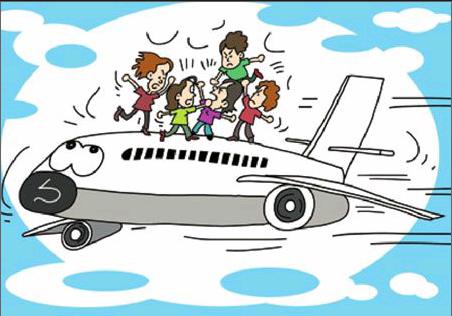Curbing Mile-High Jinks
2015-02-28ByYinPumin
By+Yin+Pumin

Passengers aboard a Chinese civil aviation flight were frozen in panic when three of the aircrafts emergency exits were found to have been unexpectedly opened just before they were to take off on January 10.
According to later media reports, the China Eastern Airlines flight MU2036 bound to Beijing was scheduled to depart from Kunming in southwest Chinas yunnan Province at 8:45 p.m. on January 9, but it was delayed by continuing snow until the early morning of the next day.
After passengers finished boarding the aircraft at 1:40 a.m. on January 10, they had to then wait for ice on the plane to be cleared, with one elderly woman feeling uncomfortable owing to hours of waiting. A dispute soon followed between passengers and the cabin crew after the co-pilots explanation failed to appease the crowd.
When the flight was ready to take off, almost seven hours behind schedule, three emergency doors were found to have been opened, forcing the pilot to turn off the engines and drive the plane back to the gate. Later, Kunming police detained two passengers, a man and a woman, and kept them in custody for 15 days for their role in the incident.
Unfortunately, the incident in Kunming was not isolated. It occurred only a short while after a middle-aged man, on board a Xiamen Air flight from Hangzhou in east Chinas Zhejiang Province to Chengdu in southwest Chinas Sichuan Province, sparked a safety scare by yanking open an emergency exit just before the plane was due to take off to “get some fresh air”in December 2014.
In response, the Civil Aviation Administration of China (CAAC) is considering putting black marks on the names of unruly airline passengers and punishing those who behave in a manner threatening safety, China News Service reported on January 15.
Diao Weimin, a professor at the Beijingbased Civil Aviation Management Institute of China, said that those who opened emergency doors could be accused of disturbing public order and harming public safety.
“Disputes on a delayed flight could be solved calmly after the plane lands,” Diao said, calling on passengers to safeguard their rights rationally.
holding your temper
Experts believe some passengers boorish behavior is related to their indifference toward airline safety.
In recent years, the number of passengers taking airplanes has seen a sharp rise in China. According to the CAAC, Chinese people made more than 353 million flights in 2013 and the number is estimated to have exceeded 400 million in 2014.
“Traveling by air used to be a luxury,”said Linda Li, who works for a travel agency in Sichuan. “But an increasing number of people on lower incomes and with little education can now easily afford it. Unlike seasoned travelers, they know little about airline safety.”
In a widely reported scandal, four Chinese passengers grabbed headlines late last year for causing chaos on a China-bound AirAsia flight, forcing the aircraft to return to its departing airport in Thailand.
The incident occurred on December 11, 2014, when a couple on AirAsia flight FD9101 bound for Nanjing in east China had a spat with the flight crew, according to Zhang Xiao, a Tv host who broke the story on Sina Weibo, a Twitter-like microblogging service in China.
The couple, who were not seated together, demanded to switch seats so they could sit together when they boarded the plane. They then requested hot water when the plane was climbing, which was chargeable and served only after the plane reached cruising altitude, according to a report by a local Tv network based in Shenzhen, south Chinas Guangdong Province, citing a passenger surnamed Wu.
The man, already annoyed by the delay, had another fight with the flight attendant over payment for the hot water, Wu said.
“A Thai flight attendant who could speak Chinese came over to explain the situation, but when she turned around, the woman poured the hot water on her back,” said another passenger surnamed Zhou.
Pictures on Sina Weibo show the flight attendant crying while covering her face. A video posted online by a passenger on the same flight shows a man screaming at flight attendants while threatening to bomb the aircraft.
After the air crew demanded an apology, the mans companion climbed over the back seats, threatening to jump out of the plane, all the while punching the plane windows, Wu added.
The in-flight brawl forced the plane to return to Don Muang International Airport in Bangkok, where the couple and two other passengers involved were taken away by Thai police. They were required to pay compensation of 50,000 Thai baht ($1,525) to the flight attendant, and all four passengers were fined a small amount of money.
On December 13, the China Nation Tourism Administration issued a statement, denouncing the passengers behavior.
As a punishment, the four passengers have been blacklisted from traveling by tourism authorities of their home province of Jiangsu. The tourism agency that arranged the couples travel has also been blamed publicly and their tour guide has had his business license suspended for a year.
Diao advised setting up a social credit report system to identify possible offenders in advance.
“In addition, tourism authorities and travel agencies should also intensify efforts to teach passengers about airline safety so as to prevent such incidents from happening,” Diao said.“Every passenger must always hold safety issues in mind when flying.”
According to the CAAC, the administration is stepping up efforts with airline companies and airports to improve their ability to respond to emergencies, and to publicize aviation safety guidelines and advocate good travel behavior.
Establishing new rules
In the wake of a rising number of clashes between passengers and airline staff over service in airports in recent years, the Beijing Municipal Government has put in place new rules.
The rules forbid entering an airport-controlled area without an airport pass, intruding into a taxiway, forcibly boarding and occupying an aircraft, climbing over or destroying an airports protective fencing and other acts that threaten air transport safety and disturb airport order.
The Beijing Capital International Airport is the busiest airport in China and the worlds second-busiest by turnover. Its passenger throughput amounted to 86.12 million in 2014, according to statistics. Construction on another large airport in the south of the city will begin next year and is scheduled for operation by 2019.
The new rules effective as of January 1 were part of a series of administrative measures at Beijings civil airports released by local authorities. They also empower airport management departments to impose administrative punishments in order to deal with offenders.
“It is right for the local government to entrust airport management with administrative punishments,” said Liu Weimin, Director of the Civil Aviation Management Institution of Chinas Aviation Law Research Center.
In fact, the State Council, Chinas cabinet, already released the Regulations on Civil Aviation Security in 1996. Seven acts in airports are prohibited by the regulations, including the circumstances listed in Beijings administrative measures.
The regulations also state that offenders will be punished.
Some passengers simply do not observe the regulations when they come into conflict with airway carriers, Liu admitted. “Passengers should safeguard their rights through legal procedures,” he said.
Some recent cases of encroaching on the tarmac or forcibly boarding mainly resulted from passengers protest or demand for compensation after a flights delay or cancellation, said a senior captain from a Chinese airline who declined to be identified.
He said that airlines sometimes adopt a noquibble policy, so they compensate passengers who provoke conflict and discord, and no punishments will be imposed unless passengers act illegally.
Whenever many passengers are stranded, airport management departments should take action to properly accommodate the passengers, according to the new rules.
The Beijing Municipal Government has also required airport management to share flight information with local transport authorities in case large numbers of passengers are stranded owing to massive flight delays.
